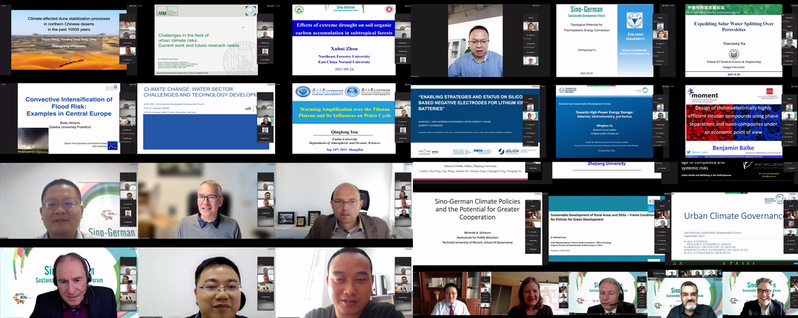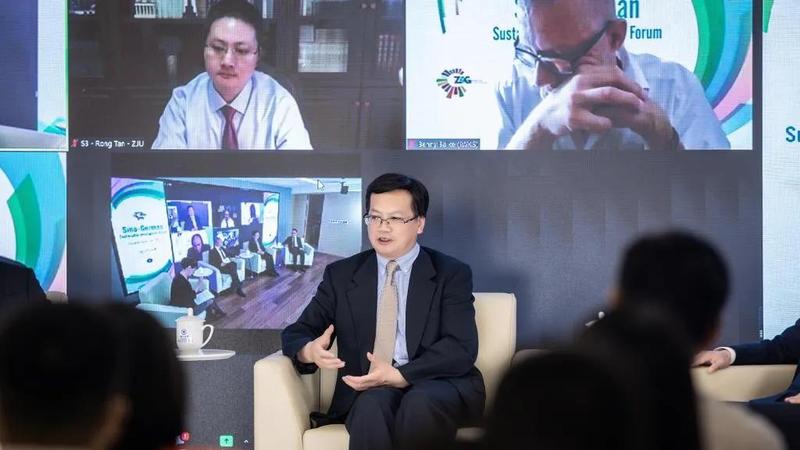On September 24th, Shanghai Institute for Advanced Study at Zhejiang University (SIAS), alongside with ZJU’s Office of Global Engagement hosted an academic forum on a topic of sustainable development, namely the ‘Sino-German Forum.’ The session consists of a series of insightful talks and a round-table discussion brought by various keynote speakers, from both academia and industry. It highlighted the importance for more multi-stakeholder engagement to promote sustainability, as part of the Agenda 2030. Over 30 professionals coming from Germany and China attended the event.
The Sustainable Development Goals (SDGs), also known as the Global Goals, were adopted by the United Nations in 2015 as a universal call to action to end poverty, protect the planet, and ensure that by 2030 all people would enjoy peace and prosperity. In this case, universities have been traditionally regarded as the main stakeholder in sustainability-related education and research. However, how can enterprises get actively engaged in this cause? What still needs to be done to facilitate university-industry cooperation? The Sino-German Forum climaxed with an “industry meets academia” roundtable to address these questions.
ZJU’s Vice President HE Lianzhen joined officials and organization leaders at the opening session. She started with an overview of ZJU’s historical and ongoing ties with Germany. In addition, she noted ZJU’s readiness to work with German institutions to “coordinate efforts and turn vision into action”.
The Forum featured three parallel academic sessions, and covered the full spectrum of research and practices, ranging from the impact of climate on natural and urban environments, novel materials for energy conversion, to Sino-German climate policies and the potential for greater cooperation.

The picture shows scholars presenting their studies at three parallel academic sessions
The last pillar of the Forum was an “industry meets academia” roundtable discussion between scholars and industry leaders. Ms Ruth Schimanowski, the Chief Representative of German Academic Exchange Center (DAAD) moderated the discussion.
Professor Ruhong Zhou, Director of SIAS, welcomed all participants and audience of the forum. Following a brief introduction of SIAS, Zhou stated that scholars at SIAS are working on the research of clean energy and power and environmental protection.
With an eye to the future, Dr. Zhou noted that there could be huge potential on academic-industry collaboration to accomplish the sustainability goals. He emphasized the joint publication collaboration, personnel exchange, and the cooperation of commercializing intellectual properties.
The necessity of enhanced university-industry partnerships was sparked by Zhou, as he stated that different measures can be taken to transform scientific research into actions that help organizations to grow, such as joint grants and appointments offered to top talents. Global network remains as strategically important as local cooperation and the Institute is positioned as a nexus in between. Scholars in different fields, industry leaders, all the people should work together to achieve the sustainability goals!

Dr. Ruhong Zhou, Dean of SIAS, speaks at the roundtable discussion
Mr. Ulf Dressler, Vice President for Corporate Communications APAC, LANXESS, stressed that “it is important to shift the discussion from moralistic standpoints to knowledge and concrete work”. Citing LANXESS as a case in point, he said companies can educate future leaders and responsible citizens through research competitions, hackathons, internships and scholarships, etc., many of which must be run in partnership with universities.
For SAP, it is crucial to help corporate companies achieve smart management and operations. Central to its products and services are three pillars, namely climate action, circular economy and social impact. SAP is also working with leading universities and peer companies to create a standard for measuring and disclosing the environmental, human, social and financial value companies provide to society, according to Mr. Phipps Xue, Senior Director of Strategic Partnership and Innovation, SAP Labs China.
Vice Dean of SIAS and one of the main organizers of the Forum, Dr. Kun Luo, also noted that the event has received registrations from over 400 participants across 15 countries and regions, with livestream attracting more than 100,000 views. He added that such statistics is a strong demonstration of the current global attention on the sustainability issues from the researchers and general public.
Official who made an appearance at the event:
Mr. FANG Jun, Deputy Director-General of the Department of International Cooperation and Exchanges, Chinese Ministry of Education; Mr. Pitt Heltmann, Consul General of Germany in Shanghai; Dr. Enno Aufderheide, Secretary General of Alexander von Humboldt Foundation; and Ms. Ruth Schimanowski, Chief Representative of German Academic Exchange Service (DAAD).
ABOUT SIAS
Shanghai Institute for Advanced Study of Zhejiang University (SIAS) is a jointly launched new institution of research and development by Shanghai Municipal Government and Zhejiang University in June, 2020. The platform represents an intersection of technology and economic development, serving as a market leading trail blazer to cultivate a novel community for innovation amongst enterprises.
SIAS is seeking top talents working on the frontiers of computational sciences who can envision and actualize a research program that will bring out new solutions to areas include, but not limited to, Artificial Intelligence, Computational Biology, Computational Engineering and Fintech.

